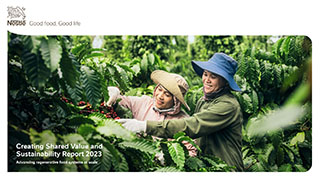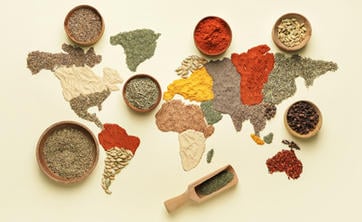Tasty and nutritious food

We offer a wide range of foods, beverages and nutrition services at scale, helping to bring tasty and balanced diets within reach for billions of people across all eating occasions and life stages.
Today, making nutritious and sustainable food affordable and accessible to all is more important than ever. Whenever we develop products, their safety, taste, texture, nutritional profile, price and quality all need to be considered. And improvements in any of these areas must not come at the expense of the planet.
Through our global R&D organization, organization, we are continually developing new products and renovating existing ones, while ensuring the good taste of familiar brands beloved by millions.
Our progress in making our brands better for you
Why and how we’re growing our nutritious food
Our priority is to grow our more nutritious portfolio by continuing to invest in R&D to innovate and renovate our products including through micronutrient fortification.
Increasing positive ingredients such as whole grains
Our approach includes offering more nutrient-dense products by increasing positive nutrients and ingredients often lacking in diets, such as whole grains or essential vitamins and minerals.
We aim to make whole grains the number one ingredient in as many of our cereals as possible and advocate for policies that help to increase whole grain consumption. To ensure this, all products that carry the Whole Grain stamp1 contain a minimum of 8g of whole grains per 30g serving.
To go even further in this journey, we introduced in 2021 a logo called GRAINSMART™ Balance, reflecting a balanced carbohydrate profile, with reduced sugars in addition to the whole grain and fibre content. GRAINSMART™ Balance makes it easier for consumers to choose high-quality cereal products.

Reducing nutrients such as sugar and sodium
We continue to work on sugar and sodium reductions as part of our efforts to improve the overall nutritional profile of our products. To support health authorities and the World Health Organization's efforts in reducing the sodium intakes in populations, we – along with other food and beverage companies – committed to reduce sodium in frequently consumed products by 2025.
We have already achieved the 2025 sodium reduction objectives in half of these product categories and remain on track to meet our objectives for the remaining ones.
We continue to reduce sugars, salt and saturated fats, including by exploring new proprietary technologies. Our new patented sugar reduction technology reduces intrinsic sugar in ingredients such as malt or milk by up to 30%, with a minimal impact on taste and texture.
Developing plant-based products that are good for you and good for the planet
We are rapidly expanding our plant-based range to meet consumer demand.
In the United States our Natural Bliss brand launched a milk alternative that combines a unique blend of oat and fava bean protein, providing high-quality protein to bolster nutritional value.
In Belgium and the Netherlands, we have launched the Garden Gourmet Veggie Burger Deluxe range which contains more than 60g of vegetables, pulses and quinoa per serving.
In Chile, we launched a range of Maggi Veg vegan shelf-stable plant-based cooking solutions. This includes a soy ground meat replacement for popular dishes like tacos and is a reliable source of high-quality protein and fiber.
Providing nutritional solutions for specific needs and conditions
Nestlé Health Science offers an extensive portfolio of science-based consumer health, medical nutrition and supplement brands. It is a global leader in vitamins, minerals, herbals and supplements.
For example, Nestlé Health Science has developed a texture-modifying solution that helps patients with swallowing disorders to more safely consume liquids.
SimpLink provides a more efficient, easier and hygienic way for carers to provide medical nutrition to individuals who are tube-fed. It eliminates risk of spillage and reduces potential risk of contamination through portion-sized, squeezable bottles that fit directly into feeding tubes.

Helping patients with diabetes
Our scientists have conceived a highly concentrated nutritional microgel, developed from whey (a by-product of the dairy industry) that can help people with diabetes manage their condition.
Results from clinical trials showed that in patients who consumed the gel, their glucose levels were reduced by 22%, reducing post-meal blood sugar spikes, and their body’s insulin response was significantly improved. We presented our findings at the annual meeting of the Association for the Study of Diabetes in 2021.
Lean Cuisine is committed to providing delicious food made with quality, well-balanced ingredients that can help people achieve their personal nutrition goals without sacrificing taste or convenience. We offer a variety of options that meet the nutrition guidelines of the American Heart Association® (AHA) Heart-Check Certification and the American Diabetes Association® (ADA)’s Better Choices for Life program.
We want to offer people a variety of plant-based food and beverages that complement their daily diets in a nutritious, sustainable, and affordable way. By leveraging our global reach and innovation capabilities, we continue to launch great-tasting plant-based products, across brands, categories and in many regions of the world.









